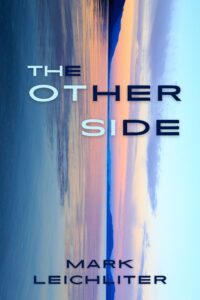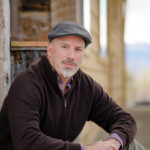 Novelist Mark Leichliter is here today to chat with me about his new crime fiction, The Other Side.
Novelist Mark Leichliter is here today to chat with me about his new crime fiction, The Other Side.
Bio:
The Other Side is the crime fiction debut from Mark Leichliter. Writing as Mark Hummel, he is the author of the contemporary literary novel In the Chameleon’s Shadow and the short story collection Lost & Found. His fiction, poetry, and essays have regularly appeared in a variety of literary journals including such publications as The Bloomsbury Review, Dogwood, Fugue, Talking River Review, Weber: The Contemporary West, and Zone 3.
A former college professor and writing program director, he has also taught in an independent high school, directed a writers’ conference, and worked as a librarian. He is the managing editor of the nonfiction magazine bioStories, is on the resident faculty of the Jackson Hole Writers Conference, teaches workshops and courses in fiction and memoir, and helps other writers as a writing coach and editor. He writes from his home in Montana’s Flathead Valley.
Welcome, Mark. What inspired you to write this book?
My wife and I moved to Western Montana seven years ago after some years living near Jackson, Wyoming. Every place has its own flavor, and this one was filled with new faces, some new rhythms, and lots of new country to explore. That meant a lot of walking, sometimes in the back alleys of the valley’s villages and working towns, but more often on trails in thick woods and up steep ridges. In Montana, if you walk regularly, you walk in all kinds of weather and under all kinds of skies. It was on those walks amid the tugging appeal of new place that the I found the origins of what became The Other Side. Part of the inspiration was simply what my friend Al calls “moody weather”. Another inspiration came from a lot of backward looks over my life as my children began to have families of their own, including a great deal of thought about times when real crime has entered my life. I lost a cousin to murder, my best friend committed armed robbery; and my dad, a grocery store, manager suffered through several burglaries, break-ins, threats, and more than once, he tackled (literally) people shoplifting steaks, whole hams, even fish. A guy a year behind me in high school murdered his grandparents, and I’ve encountered more drug dealers that is suitable for healthy living. It’s not a far leap from reconnecting with such memories to imaging other kinds of incidents and other kinds of lives impacted by criminal activity.
Excerpt from the first chapter of The Other Side:
For the first time in two days Sheila Rodgers was alone. In quiet she might think, might solve the riddle of her daughter’s absence. Yet she hadn’t a moment’s quiet before her younger sister called with accusations that Sheila was overreacting. Her sister’s reprimands echoed those of her husband, who grumbled that Britany was “pissing right in our faces. Off God knows where playing adult.”
“The police should be forming search parties,” Sheila had pleaded with him. “They should be using helicopters and dogs.”
“Stop it,” he had replied. “She lied to us and now she’s knows her lies are gonna come home to roost. When she drags her butt home, she’s got questions to answer.”
“Tom,” Sheila pleaded. “We have no idea where she is. Anything could have happened.”
“She’s testing us is all. Now she’s afraid to own up to it. You’ve been too soft on her.”
Her husband’s voice had sounded again in her head as her sister said, “So she’s not your perfect angel, Sheila. You and I both have some stories we’d rather mom didn’t know. I’m sure she went to a party or something, had a few drinks. She’ll be home any time now, embarrassed for a hard lesson learned. Don’t make a mountain out of a—.”
Sheila had touched “end call” while her sister was in mid-sentence and then immediately dialed Britany’s phone, praying her sister and husband would be right. She’d gladly let them throw her “overreaction” in her face if it meant Britany was okay. Britany’s recorded greeting on her voicemail still sounded as Sheila dropped the phone on the couch. She followed the phone’s path, slumping like a marionette cut from its strings.
What exciting story are you working on next?
I’ve got two book projects going at the moment. The first is literary/historical fiction. A young woman, feeling isolated by her little family’s current economic situation and raising an infant while trying to work from home during the COVID pandemic finds the old files and notes from a former owner of the home she and her husband rent. Those documents begin to reveal the life the woman, Lillian, who worked in the diplomatic corps in hotspots like Sri Lanka, Kabul, and in Saigon during the worst years of the war in Vietnam. We learn that she may have been recruited along the course of her career as an intelligence operative. Learning Lillian’s remarkable story of adventure, independence, and sacrifice inspires this young graphic artist and mother to take more chances of her own.
The other book, mostly in the research and notetaking stages, picks up the detectives from The Other Side and places them in the clandestine world of human trafficking when a young Native American girl disappears. The story reveals that the pipeline for smuggling young women into the sex trade comes through an unlikely and highly trusted source, one that crosses international borders.
 When did you first consider yourself a writer?
When did you first consider yourself a writer?
Consider myself a writer, hmm … some days I’m still not sure. I’m deeply devoted and ritualistic when it comes to writing but the act of writing and the act of publishing can seem far distant from one another most of the time. The truth is I have been writing practically since I could hold a pen, something my sweet mother not only reminds me about but a fact for which she kept the evidence. She literally saved handwritten stories dating back to second grade. I’ve been writing daily with a serious eye towards wanting to write work of meaning and substance since my junior year of college. It took another eight years of diligent work and learning before I saw my by-line for the first time.
Do you write full-time? If so, what’s your work day like? If not, what do you do other than write and how do you find time to write?
Yes, and no. I do truly write full-time, but I split my days between working as a fiction writer and essayist and writing for other people. My “day” job is working as a ghostwriter, editor, and writing coach. I typically have about four books going, and that’s in addition to my own. So I work on “my” projects from the time I get out of bed until late morning when I take a break to work-out. Then it’s a shower, lunch, and I jump into whatever book or books has/have the most pressing deadline with its editor. In the late afternoon, I move to editing or writing coaching projects, which is always about trying to help other writers find their stories, improve their craft, or ready their material for publication. That means reading submissions for the magazine I edit, “Zooming” with writers on a critique follow-up, or getting knee-deep inside a manuscript. Late in the evening I return to the work I’ve done on my own projects to read the day’s output and stimulate energy for the following day. Typically, I have a question to ask or a problem to solve, and sometimes I awaken with insights. I finish my day with the reading I want to be doing, whether that’s a book I have promised to read for a colleague or the “pleasure” reading I’m doing at the moment. I put “pleasure” in quotations marks because while reading really is one of the great joys of life, I’m always trying to learn by reading as a writer and studying technique and style.
The most frequent question I am asked by those who know me well is: “How do you keep from getting all the books you’re working with mixed up?” I don’t have a real answer for that because I simply don’t find it a problem. It’s kind of like being a parent, while a few aspects of parenting draw from the same base philosophies, you also know your child as well as you can know another human being, so knowing what will work for one is often different for what will work for another and you are unlikely to get them confused. Beyond that, when you are awake to the world and really paying attention, it can seem a serendipitous place, one where an answer for one project often comes while researching or writing another project. The thought-leaders with whom I work on ghostwriting projects are energetic, innovative, smart, stimulating people, so that fuels creative energy. Still, I have to be extremely diligent in preparation and organization and scheduling, and I have to be particularly diligent about sticking to routine and not sacrificing the time I devote to my own creative work.
What would you say is your interesting writing quirk?
“Quirk” is probably an understatement. I get a bit Type A when it comes to some writing rituals, perhaps because I am juggling so many projects and also because I’m a great believer that a writer has to get to productivity without a lot of procrastination. So I have some entrenched habits. I write in the same place, for one thing, and when working on a novel, story, or essay, I only write in longhand and only on legal-size yellow tablets. I write with only one pen—a fabulous gift from my brother and his wife. I only edit with another set of pens. I only journal with still another, different pen. My yellow pads get so thick with revisions that I’m the only one who could possibly type from them, but a good deal of scratch and rewrite, and arrows, and back-of-pages work happens before I move to the laptop.
As a child, what did you want to be when you grew up?
For the longest time I wanted to be an architect. Architecture still fascinates me, both in the design elements and in the engineering elements. One day I’ll write a novel with an architect as the protagonist. I actually do think writing and architecture share a lot in common, certainly in as much as they are a mix of art/vision and structure/pragmatic features. That’s what I love most, blending the necessary, like those things that move a book forward and keep a reader engaged, with the artful, the graceful decisions of order and structure (what is often literally referenced as book architecture) and the tonal and stylistic decisions of language and syntax.
Anything additional you want to share with the readers?
Most of all, thanks for being readers. The book that sits on the shelf gathering dust is still a book (in the tree that falls in the forest sense), but without a reader, it doesn’t mean much. So thanks for supporting books and writers.
I have other stand-alone books if readers enjoy The Other Side. A visit to my website can introduce readers to those. And I encourage you to use the website to sign up for my newsletter; I don’t pester with any regularity but do highlight great books by other writers that I encounter and try to give insights into the genre and a writing life.
Links:
Website | Twitter | Instagram | Amazon | Barnes and Noble | Apple Books
Thanks for being here today, Mark.

Thanks, Lisa, for hosting me!